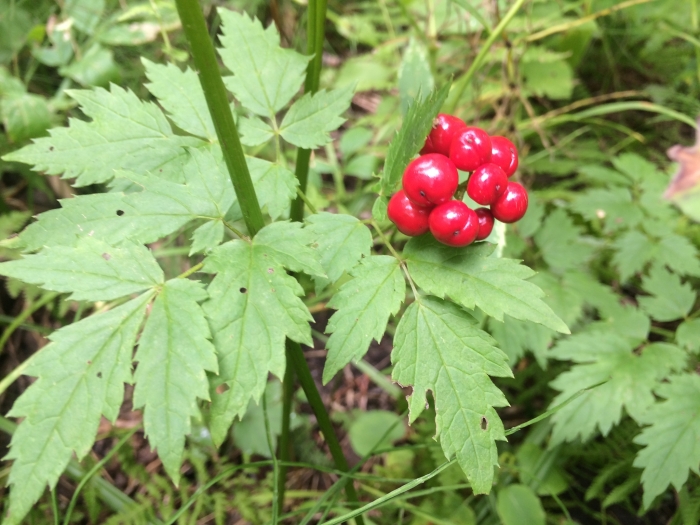Red Baneberry
(Actaea rubra)
Red Baneberry (Actaea rubra)
/
/

Derek
CC BY 4.0
Image By:
Derek
Recorded By:
Copyright:
CC BY 4.0
Copyright Notice:
Photo by: Derek | License Type: CC BY 4.0 | License URL: http://creativecommons.org/licenses/by/4.0/ | Rights Holder: Derek | Publisher: iNaturalist | Date Created: 2016-08-19T15:10:38-07:00 |






















































Estimated Native Range
Summary
Actaea rubra, commonly known as Red Baneberry, is a perennial herb native to the cool, moist woodlands, and forest understories of the Northern and Intermountain regions of the USA, the Pacific Northwest, and much of Canada. It typically grows 40 to 80 cm (16 to 31 in) tall and is characterized by its coarsely toothed, deeply lobed leaves. Red Baneberry produces one to a few ternately branched stems, each topped with clusters of small white flowers. The flowers have 3 to 5 petal-like sepals, which are obovate in shape and remain after the petals, which are deciduous, fall away post-flowering. By mid to late summer, the plant bears bright red berries, or occasionally white in the forma neglecta variety, each adorned with a distinctive black dot.
The striking berries and the plant’s upright clump-forming habit make it a charming addition to shade gardens. Red Baneberry is valued for its ornamental berries and foliage, and it is often used in woodland plantings and as an accent in shaded borders. It prefers partial to full shade and consistently moist, well-drained soil rich in organic matter. While it is relatively low-maintenance, it is important to note that all parts of the plant, especially the berries, are highly toxic if ingested. Care should be taken to plant it away from areas frequented by children and pets.CC BY-SA 4.0
The striking berries and the plant’s upright clump-forming habit make it a charming addition to shade gardens. Red Baneberry is valued for its ornamental berries and foliage, and it is often used in woodland plantings and as an accent in shaded borders. It prefers partial to full shade and consistently moist, well-drained soil rich in organic matter. While it is relatively low-maintenance, it is important to note that all parts of the plant, especially the berries, are highly toxic if ingested. Care should be taken to plant it away from areas frequented by children and pets.CC BY-SA 4.0
Plant Description
- Plant Type: Herb
- Height: 1-3 feet
- Width: 1-3 feet
- Growth Rate: Slow
- Flower Color: White
- Flowering Season: Spring, Summer, Fall
- Leaf Retention: Deciduous
Growth Requirements
- Sun: Part Shade, Full Shade
- Water: Medium
- Drainage: Fast, Medium, Slow
Common Uses
Bee Garden, Bird Garden, Butterfly Garden, Deer Resistant, Fragrant, Hummingbird Garden, Rabbit Resistant
Natural Habitat
Cool, moist woodlands, and forest understories
Other Names
Common Names: Snakeberry , Actée Rouge , Pain De Couleuvre , Poison De Couleuvre , Amerikansk Trolldruva , Western Baneberry , Chinaberry
Scientific Names: Actaea rubra , Actaea rubra f. rubra , Actaea rubra var. rubra , Actaea americana var. rubra , Actaea brachypetala var. rubra , Actaea erythrocarpa f. kamtschatika , Actaea spicata subsp. erythrocarpa
GBIF Accepted Name: Actaea rubra (Aiton) Willd.